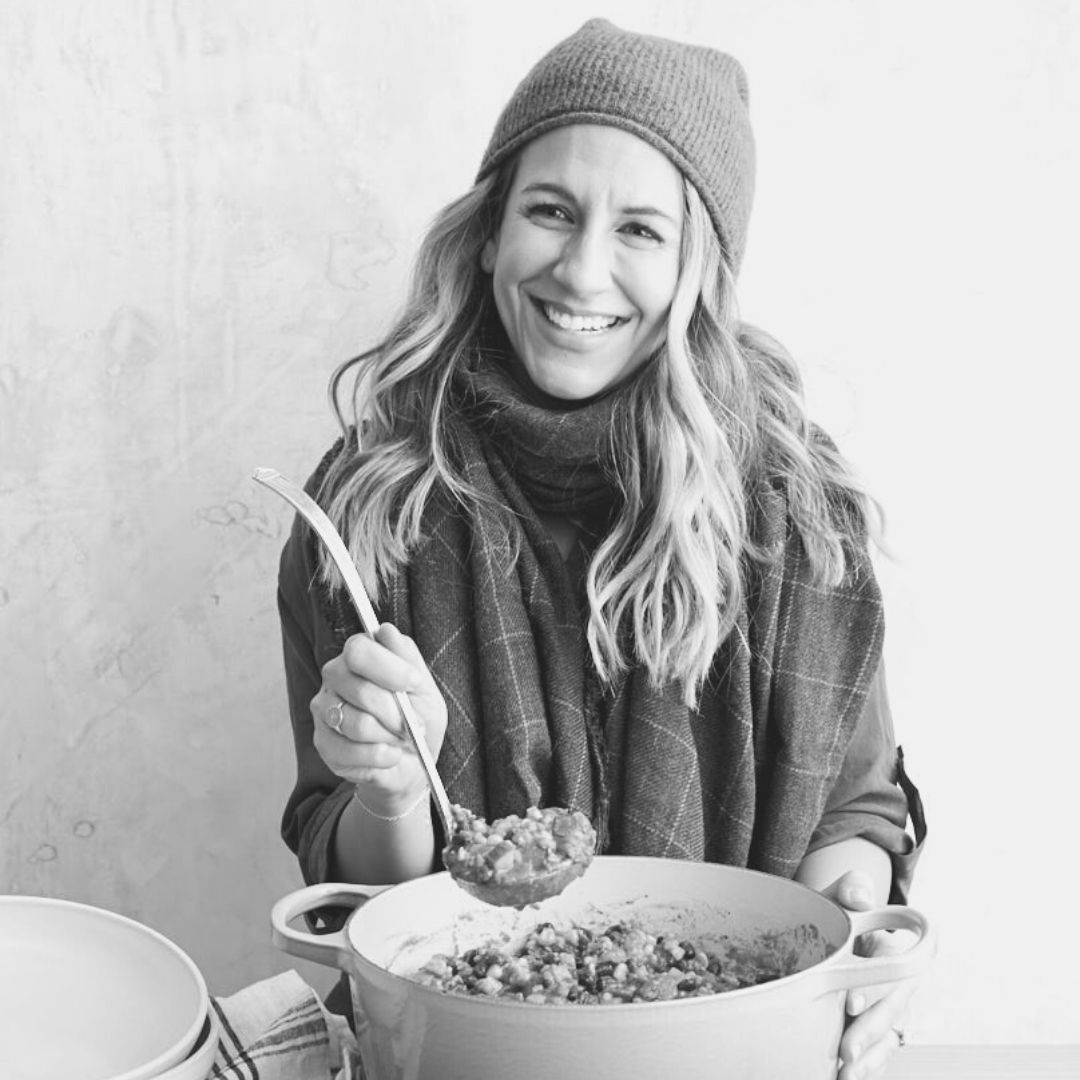
Take The Hell Out Of Healthy Eating
Take The Hell Out Of Healthy Eating
Ever found healthy eating stressful and overwhelming? This week, fellow health coach and Founder of Party In My Plants, Talia Pollock, joins me in a light-hearted conversation to chat about her brand new book, Party In Your Plants.
In this episode, Talia goes on to humorously share practical advice on how we can make healthy eating more fun and healthy cooking less sucky.
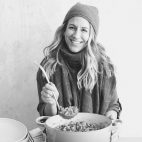
Talia Pollock
Plant Based Chef
Transcript
Maria Marlowe: [00:00:34] Welcome back to the Happier and Healthier podcast. Today’s guest is my friend Talia Pollock, the author of the newly released Party In Your Plants. Talia is one of the funniest people I know. We’ve been friends for many, many years. She’s a fellow health coach, and I’m so excited to chat about her brand new book because it is hysterical, just like her. This book will help you eat more plants, but also do so in a fun and easy way, as Talia likes to say. She takes the hell out of healthy eating to celebrate the launch of her new book. We’re giving one lucky listener a free copy of her book, Party in Your Plants. To enter simply head over to my Instagram @mariamarlowe and you can enter to win.
Maria Marlowe: [00:01:28] Are you interested in cooking healthier at home but don’t know where to start? I’m here to help. If you want to learn how to make healthy food tastes delicious at home. Sign up for my brand new online cooking course, Healthy by Marlowe Cooking School. This completely digital program will teach you the skills you need to whip up flavorful crave-able nutrition packed meals, mostly in 25 minutes or less. You’ll learn how to chop sear, sauté, Roast and steam like a pro. Unlike most cooking courses, which focus solely on technique with no regards to health in this cooking course will focus on technique, nutrition and flavor so that you and your family actually look forward to eating healthy food by the end of this four week class. You’ll feel more comfortable and confident in the kitchen and behave with more than a dozen easy recipes that you can alternate and repeat. You’ll even learn how to whip up a nutritious, flavorful, crave-able meal with whatever ingredients you have on hand. No recipe needed. To join head to mariamarlowe.com/cooking-school and sign up today.
Maria Marlowe: [00:02:46] If you’re looking to improve your health, and especially if you want to improve your digestion, you’ll have to check out the probiotic brand hyperbiotics. It’s the most effective probiotics that I found on the market. And it’s the brand that I personally use and recommend to all of my clients. It’s so effective because it’s made with 15 different strains of probiotics that have been scientifically shown to benefit digestive and overall health, including weight management, reproductive health and mood. They’re also clinically shown to be 15 times more effective than the common probiotic capsules that you’ll find at the health food store Hyperbiotics has helped many of my clients and myself get rid of bloating, increased regularity and maintain a flat stomach and healthy digestion for being so high quality. You expect them to be super expensive, but they’re extremely affordable. Just twenty five dollars for a one month supply. Plus you get an additional 25 percent off with a code HYPERMARIA. Head to hyperbiotics.com, that’s h y p e r b i o t i c s dot com. And use the code HYPERMARIA for 25 percent off.
Maria Marlowe: [00:03:55] If you’re looking for all natural skincare products without harsh chemicals, useless fillers or other nasty things you don’t want to in your bloodstream. Check out Primally Pure. It’s a California based skin care line that started from a farm. So you can bet that all the ingredients are all natural, yet extremely effective. I love their beauty cream, Fancy Face Serum and deodorant. Head to primallypure.com and use code MARIA10 for 10 percent off your order.
Maria Marlowe: [00:04:27] Talia, thanks so much for being here.
Talia Pollock: [00:04:29] Oh, my God. Thank you so much for having me.
Maria Marlowe: [00:04:32] I know now the seats are reversed. I’m usually on yours & you’re usually on mine.I am so excited for you and your new book. How is it going? The book just came out. What’s going on? Like, how is it going? How is it to release a book in a pandemic?
Talia Pollock: [00:04:51] Oh, what a fun question that I totally thought I would be answering on my book tour. You know, we’re totally prepared to answer what’s it like watching a book in a pandemic? But now this is completely bizarre, uncharted territory. But, you know, the amazingness is that the reviews of my book, the comments of people reading, I mean, people are home right now with plenty of time to read for the most part, and they’re really reading it. And that’s exactly what I wanted when I wrote the proposal for my book, when I dreamt it up. I said verbatim, like, I don’t want this book to live in someone’s kitchen. I wanted to live in their nightstands, their kitchen, their coffee table. And I’m having people telling me, like, I don’t know where your book should live. I’m reading it outside, I’, reading it in bed, in the bath and the kitchen. And it’s just that’s been so heartwarming and just Life-Giving. So for that, I’m excited and grateful.
Maria Marlowe: [00:05:48] That is awesome. So of course, the book is called Party and Your Plants. Yes. It’s the name of also your podcast and your business and all of that. So what is party and my plants are party in your plants. How did you come up with this name?
Talia Pollock: [00:06:03] Oh, man. So my journey to Plantsville USA was a long and winding run at one and a desperate one. So for over eight years of my life, I really, really, really struggled with my health. And I sought out every healer I could think of multiple gastroenterologists, because it was really my stomach. That was the crux of the problem. Nutritionists, naturopaths, hypnotherapist, everyone. I did all the poop tests, the blood tests, the breath tests. In the most anyone could really tell me was you have IBS, which really is just like a life sentence. You know, like, hey, your stomach hurts. We don’t really know why. We can’t really tell you why, we can’t give you a solution by was really the message that I got. And what that led to was crippling anxiety, depression. I mean, when your stomach hurts all the time, it’s really hard to have energy. It’s really hard to have confidence in your gut. They say is your second brain. And so that having that compromise really affects your immune system, your whole body, your whole life.
Talia Pollock: [00:07:12] So I was in college when this really peaked. And in college, you know, you’re supposed to be pulling all nighters and taking all your classes and being so social and, you know, living it up. And I was just like hibernating in my dorm in the fetal position, feeling so sick all the time. Now, at the same time, I was an aspiring comedian, which I suppose makes sense because, you know, a lot of comedy comes from pain and darkness. And I was quite depressed and I just had a real passion for writing words that eased other people’s pain. I mean, that’s really what comedy is, right? It’s like we laugh when we recognize somebody saying something that we’ve struggled with. I guess that’s why so many comedians do relationship jokes or sex jokes or wife husband jokes, because we’re all like, oh, yeah, like I feel that way. Ha ha ha. And so I loved the art and the craft of that.
Talia Pollock: [00:08:06] So this led me to L.A., where I was interning for Adam Sandler’s production company. And in the not internship time, I was seeking out all the wellness stuff that L.A. had to offer. I took my first ever spin class, never had heard of spinning. That was pretty cool. This was in 2009. I got my first colonic.Wow. Yeah, my first ever juice. Wow. You know, that wasn’t like Tropicana orange juice. And my mind was being blown and I was just being guided. So, like, all got all these different places in. One place I went to was this healer who like touched parts of my body and told me what supplements I needed to get. And so I got to cure a parasite that they said I had. I was buying all these supplements and I told the receptionist as I was checking out that I was hungry. She said, go across the street to Planet Raw. They have amazing coconut smoothie.
Talia Pollock: [00:09:03] So I say, OK, go castrate this really hippy dippy, you know, neon lights, woah in sense kind of place in Santa Monica. I order the coconut smoothie. I hand it to me is this white, creamy, frothy thing. I say, I’m sorry, I can’t do dairy. They say, sweetie, this is vegan. I don’t know what vegan means I take the smoothie, drink it on the street and for the first time in, like, over eight years I consumed something that made me feel good. I was like, what is this smoothy thing, what is this vegan thing? And from there, I proceeded to dive headfirst into the plant eating world, sat in Barnes and Noble, transcribing cookbooks and and recipe books and lifestyle books on eating plants, going vegan because this is before blogs and Instagram and all this stuff. So I was just eating up all his knowledge, went back to school to finish up and was the healthiest version of myself I had ever been.
Talia Pollock: [00:09:55] But when you’re in college, when your peers are, you know, doing keg stands and drinking box wine, it’s a little odd to be in your dorm dehydrating granola and juicing kale. And I became what I call a health nut hermit. I deactivated for my sorority. I started taking online classes for my on campus apartment. I just felt like a total misfit, an outcast. I was so insecure about my diet and my lifestyle that I dropped out of society. So the idea was I graduated college healthier than ever, but more unhappy than ever. And that’s really where this why should one have to choose between their health and their happiness thing started and then it led to the creation of party my plants, which is the fusing of health and happiness, and also the fusing of my passion for comedy with my passion for plants.
Maria Marlowe: [00:10:47] I love it. I love your story. You are so funny. Talia and I, like, go back a long time. I mean, I went really long time, probably 20, 13, 2014.
Talia Pollock: [00:11:01] You were still living in Brooklyn. In that real cool apartment in Brooklyn.
Maria Marlowe: [00:11:08] Yeah Talia you had come over to some… I was like hosting this like health coach meetup or a wellness meetup type of thing and Talia had these amazing pumpkin. What were they mookies? Or something like.
Maria Marlowe: [00:11:08] Yeah Talia you had come over to some… I was like hosting this like health coach meetup or a wellness meetup type of thing and Talia had these amazing pumpkin. What were they mookies? Or something like.
Talia Pollock: [00:11:19] Teff cake-y cookies. Chocolate cake-y cookies.
Maria Marlowe: [00:11:24] Yeah. So anyway but if you guys had saw my real food grocery guide book trailer Talia has a cameo in the grocery store. It’s actually quite funny. You really need to see that.
Maria Marlowe: [00:11:38] But I just love that you make us so light hearted because I feel like healthy eating can be really overwhelming to people and it can become militants. Right. And I think that’s it gathers just you know, when someone discovers this whole new world of healthy eating, it can just be overwhelming and it can like it can make you want to just remove yourself from society because you’re like you realize like, oh, my God, I can’t believe people are eating this. I can’t believe people are doing this. I don’t want to do it. So you just kind of become a hermit like you were talking about. So how do you take the hell out of healthy eating, as you like to say? How could we make healthy eating more fun and less restrictive?
Talia Pollock: [00:12:20] Yeah, well, I think that a lot of people fall into this all or nothing mentality, right? I think that’s a huge both barrier and problem. You know, so it’s a barrier to get people to even want to eat some plants because they think that some plants has to mean only plants forever and always. And that’s a huge barrier to entry. That makes it seem really sucky and lame. And then I think there’s a lot of people that fall into the plants and then become obsessive about eating the plants and then say, I have to only eat the plants. And then that becomes sucky, too, because sometimes it’s hard to only eat plants like when traveling was a thing and maybe it will be again someday. That’s when, you know, that’s not always easy in an airport. Perfect. You know, or when you’re socializing, that’s not always a perfect best case scenario. And so there has to be some flexibility.
Talia Pollock: [00:13:14] So my real guiding principle for everybody is to just eat more plants in a given day, week, year. Lunch, dinner, snack than you’d eat crap and crap I define as chemical, refined, artificial and processed food. And if you just focus on that one philosophy, that one goal to eat more plants than crap, then I feel like it really takes the stress out of it because all the other stuff just kind of falls into place, you know, like all the oils and the needs and the dairy. Like, that’s personal preference. And you have to listen to your body. But if you just focus on eating more plants than crap, then it’s kind of hard for that to suck, in my opinion. Yeah.
Maria Marlowe: [00:13:59] That makes it so simple and so easy. And I love how you put it like that because it’s memorable and it does make it easy. So I really I really like that philosophy. And you spend a lot of time cooking. So I know that’s a big part of making healthy eating more fun as cooking more so. What are some of the things that you’re typically making in a typical day or some of your favorite recipes from the book? Perhaps. What if you’re eating the party and my plants? What are you actually eating?
Talia Pollock: [00:14:31] Well, funny enough, maybe. I don’t actually love cooking all that much. And while going on all these podcasting shows and stuff for my book, I’ve been revealing this earth shattering secret of mine that truth is, I’d rather be out of in life living than in my kitchen cooking. And what happened was because I stumbled into the plants before, the world’s really caught on to the plants. So like I said, it was 2009 when I learned about how great eating plants can make you feel. The only way to get almond milk was to make it yourself. The only way to get coconut water was to take like a machete. Crack open coconuts, drain out the water. And then I would also scoop out the meat in order to, like, process it in a blender to make ice cream. All right. That’s how I got vegan ice cream and that’s how I got coconut water. I was making my own almond milk. So there it was required to spend a lot of time in the kitchen in order to eat the plants because the plants made me feel, look and live my best life.
Talia Pollock: [00:15:37] But fast forward eleven years and you can find almond milk at a gas station and coconut water. And so it’s so much more accessible for the most part to eat more plants, which is amazing and which means that less time needs to be spent doing all the laborious stuff in the kitchen, which if you also don’t find cooking to be this meditative artistic experience is great news. But because I love how plants make me feel, I do end up in the kitchen quite a bit, especially right now, in our times, I’m only in the kitchen.
Talia Pollock: [00:16:15] And so for that, I employ my philosophy of when you make any, make many. And that is my way of not having to worry about meal planning and batch cooking. Right. Anything like that. If I’ve got my booty in the kitchen go me, high 5, up top. I’m going to make double, triple, quadruple the amount of the same recipe that I’m making. So it lasts me many more days or so. Then maybe I can freeze some. So it can last me, you know, weeks. And so that’s one way to just make healthy cooking suck less that when you’re actually in the kitchen, just make a lot of extra so you can use leftovers because I say leftovers of the best over. So what that ends up looking like for me is I make a lot of sauces and I think sauce is really up level all vegetables. So I have a ton in my book of different pasta sauces there. I have a cauli-fredo sauce like a cauliflower Alfredo. I have a bunch of pestos and like herby avocado sauce. I have butternut squash, like cheesy sauces.
Talia Pollock: [00:17:21] So I’m a huge fan of sauces because you can make it and then keep it and then keep adding it to different vegetables and plant stuff throughout the week. And I’m also a big fan of making high protein snacky things like black bean brownies or chickpea Blondies and stuff like that, using plants and the protein from plants. That makes you feel full and satisfied.
Maria Marlowe: [00:17:45] Well, it sounds really delicious and it sounds really easy. I mean, I’m also a huge proponent of when you’re in the kitchen, cook more than you plan to eat right then. Because you won’t have to come back. So you won’t have to cook so soon after. So I love that. That all sounds delicious. And can you talk a little bit about. I know that one of the big reasons for eating this plant based way is energy. And so you feel better. So can you talk a little bit more about that? Why is that such a big focus for you? And how does this way of eating help you achieve that?
Talia Pollock: [00:18:23] Yeah, well, what happened was when I had that smoothie, I realized, oh, my God, food makes us feel stuff. What! This was earth shattering, earth shattering, ground breaking, mind blowing information that things I put in my body can make me feel good, can make me feel energized. And that was really what I got hooked on. Which kind of spiraled my plant partying into this epic way of life in which I guide my food choices based on how food makes me feel. And I’ve coached so many people over the years using this same way of thinking. Choose your food based on how it makes you feel. Because we’re not a victim, to you know, we don’t have to just feel powerless. Food doesn’t come into our body like willy nilly, and we just feel things willy nilly.
Talia Pollock: [00:19:21] We get to control our energy and our joy and how we show up in the world based on what we’re consuming. And for me, that started for a really long time with the food. I chose my food based on how I felt and how the food made me feel. And that’s how I would guide my choices. And that’s how when people asked me, how do you have so much willpower or how do I get more willpower? I say, well, it’s not about willpower. It’s about I want to feel good. So I’d make my choices based on what makes me feel good. And so eventually, once I understood this and you know that this was my way of life, I actually started expanding it past food because, yeah, food makes us feel certain ways. But so does exercise certain types of exercise. Certain times of day of exercise. People affect our energy. How does this person make me feel? How does this color on my wall make me feel? Or this couch? When you start rearranging your entire life based on how things make you feel, you’re really in control of your energy and you can really live an awesome life.
Maria Marlowe: [00:20:22] Hundred percent. And I love that reminder to choose based on how we feel. Right. Because you don’t need willpower at that point. That’s that’s great.
Talia Pollock: [00:20:32] It’s not challenging. Yeah, it’s not challenging. You’re not like, oh, let me consult my diet plan or let me consult my meal plan here. Ooh I want this. But I’m not going to do it. No. It’s like this makes me feel good. And so I want more of that. This I’ve noticed doesn’t make me feel good. So I, I’d like to feel good today, please. So I’m going to lovingly avoid that.
Maria Marlowe: [00:20:51] Yeah. I think the biggest hurdle for a lot of people is that they don’t even know. I know just in my own experience, coaching people, that a lot of times people, because they feel like crap every day, they just think that that’s how you feel and they don’t even realize there’s another way. So I think having this conversation around helping people to understand that our food choices do make us feel different ways and to be more mindful about it, to start keeping a food diary or a mental log or whatever it is, just so you can see, OK, when I eat this, this happens. My stomach hurts. I get a headache. I get this. I get that. And when I don’t eat it, oh, it goes away. And yeah, once we’re more mindful about what we’re eating, we can see how every little thing that we eat does make us feel differently and look differently.
Talia Pollock: [00:21:43] I mean, you’re you’re the expert also on the skin and how it affects our beauty.
Maria Marlowe: [00:21:47] Yeah, yeah. For me that was a big one. We had a great episode at your party in your plants podcast on skin and food. But yeah, I think really everything that we eat, it does affect us. And it’s just a matter if, you know, are we really listening to figure out what it’s doing or are we just kind of ignoring the signs?
Talia Pollock: [00:22:06] Yeah. And it’s a fact. I mean, food makes us feel stuff and makes us look stuff and makes us do stuff. So I think that’s the first step is like accepting that as like a fact and then observing how that fact affects you. Yeah.
Maria Marlowe: [00:22:21] So what would you say are your top five favorite foods, things that you always have in stock in your kitchen?
Talia Pollock: [00:22:29] Ooh. That’s a fun question. I always have sweet potato. That’s one of my like comfort. It’s like I sit my security blanket food. I always have frozen cauliflower because. Oh, my gosh, do you put it in smoothies? Because it is like the best thing in the entire world.
Maria Marlowe: [00:22:45] I do. And you know what I’ve been making recently? Cauliflower. Oatmeal.
Talia Pollock: [00:22:49] Oh, I’ve done that, too.
Maria Marlowe: [00:22:51] It’s really nice with some coconut milk. Oh, my goodness.
Talia Pollock: [00:22:55] Frozen cauliflower. I mean, you can buy it riced now. It’s epic. It’s just. It thickens smoothies. Yeah. Like for oatmeal. It’s so good. It’s so filling and. Oh, I love that. I always have green apples because my stomach loves them and they’re a wonderful snack. My first ever screen name was Green Apple Girly one. I’ve been on brands since then. And the theme of my bar mitzvah when I was 13 was green apples. We had green apples centerpieces.
Maria Marlowe: [00:23:24] Oh wow. You’ve been listening to your body a long time, I guess.
Talia Pollock: [00:23:29] So some sort of nut butter situation, obviously, you know, nut butter can be very helpful in making things fill you up more. And kombucha. I’m always. Yeah, you won’t ever open my fridge or not find kombucha because it’s just so good for your gut and it’s so fun to drink. You can add a little little vodka or tequila if you want to have an extra fun time with kombucha. So. So that’s fun.
Maria Marlowe: [00:23:53] I love it. Yeah. Those are all great options. I feel like for me, for kombucha. I used to drink it way back in the day, but I feel like it would always like bloat me. So I wasn’t like, I’m not super fond of the kombucha personally, but I love that you were saying like, oh, I like this because my gut likes it. So can you just talk about that a little bit? Why do you think your gut likes it and how do you know? Because again, I just feel like sometimes people don’t realize that their gut is speaking to them.
Talia Pollock: [00:24:23] Well, I mean, I was blessed with IBS, with a stomach that speaks to me with a whole body and system that screams at me. So I have that going for me, which, you know, for a long time I resented that. Obviously I thought it was my biggest curse. I hated my stomach. I hated how sick my body would get. And then I learned that it’s really like an internal G.P.S.. It’s a real alignment tool. That’s when I consumed something. You know, that isn’t on in alignment for me or the best thing for me. My body talks to me and for that I’m very grateful. And so, like I said, I got a lot of my choices based on that. So kombucha is wonderful for me because it’s fermented and it has a ton of probiotics in it.
Talia Pollock: [00:25:06] So I also rely heavily on apple cider vinegar for the same purpose, a drink in the morning with two tablespoons of apple cider vinegar every day, which is so good for your gut as well. I often use miso in making sauces, another fermented probiotic rich. It’s a paste that you can add to add flavor to things. I have sauerkraut, so I’m big on the good bacteria. The probiotics for my sensitive tummy. But that’s very important for everybody. I mean, it’s great for your skin. It’s great for your gut. Health in general. And everyone needs good guy health. It’s very important for our immune system to have good gut health.
Talia Pollock: [00:25:43] So that’s why kombucha is awesome. And I think that people, we are always feeling things, you know, even though my body might scream those things to me louder than someone else’s, we can tune in and I’ll say my husband never had, like, health issues or never, you know, when we met, like seven years ago. He never complained about his health or his guy or his, you know, anything. But after learning the plant party way and eating more nutritious plant-y foods, when he would go out with his friends and get the big steaks and the manly stuff and whatever he would like be food hung over for two days, like he would all of a sudden start getting the stomach aches when eating the food he normally eight or if he would drink a soda like he used to, he would just feel yucky. And that was because he learned how good he could feel. And then, by contrast, he realized how bad these things really made him feel. And so one of the issues is that a lot of people don’t know how much better they could feel. But we’re here, right, to tell people you can feel a lot better. You know, it’s possible. And so I think once you start to experience that, you can really see how other things adversely make you feel 100 percent.
Maria Marlowe: [00:27:13] And it’s so interesting. I feel like our body tries to protect us a little bit when we are eating a crappy diet for a long period of time. And you’re in this little bubble where you just don’t know how good things can feel. And it’s like when you start eating more healthy and your body starts detoxing a bit, getting healthier, getting more of this nutrition than when we do eat it. We actually do feel sick. So I feel like elimination diets are always really interesting and fun because they show you pretty quickly within a couple weeks of just how your favorite foods, which you think are not doing anything to you, may actually be affecting you. Yeah. Yeah. So now now that you’re eating this healthier way, do you have any symptoms of IBS or is that completely cleared up?
Talia Pollock: [00:28:00] Yes. So the other part of the story that we didn’t get to yet, which we will get to now, is that. Well, I learned about the plants in college and I felt healthier than ever when I became unhappy, when I became that health and hermit, when I dropped out of society. And my you know, my happiness started declining and my stress started escalating. I started to feel sick again. And I learned that really through eating a green apple, I would eat the same green apple the same time of day every day because it was like my snack. And some days the apple would make me feel good and other days the apple would make me feel sick. And at the time, I was so in, like, the food mindset that I was like, there’s something must be weird about this apple. Maybe it wasn’t organic or but, you know, what I realized was that it was my state of mind that was altering how that Apple digested, altering how that food made me feel. So while the plants in general will improve one’s health and has improved my health, if I don’t keep tabs on my stress, I’m nothing.
Talia Pollock: [00:29:09] You know, the plants can’t override the stress. And that’s why I say don’t eat Brussels with a bitch face. Don’t white knuckle your kale. You know, it’s so important to season your salad with a smile, not with tears, because that stress was actually worse for you than the freakin Cheetos. Right, than the pesticides. If you’re gonna be stressed while eating, your plants are not going to digest and assimilate them properly and it’s just like almost pointless. So that’s really what happens to me. So if I don’t keep really close tabs on my stress and if I don’t work hard, is through all my different modalities to keep that keep that low. Then I will experience my IBS struggles again. So it’s like this two pronged approach. The plants and the stress.
Maria Marlowe: [00:29:56] One hundred percent. And I feel like food is often the entry or gateway drug into healthy living. As. Because it is in a way it’s the low hanging fruit. And it’s kind of like, you know, we grow up with this idea that if we’re sick, let’s just take a pill, let’s take a medicine. It’ll make it better. So that we switch that to food. So it’s like, OK, forget the medicine, I’ll eat the food. The food is my medicine. And then it can only help so much. And you realize after a little while, your mental state, your stress, your emotional well-being, all of this is just as important, if not more so. So I love that. That is also part of your wellness mantra and philosophy is keeping your stress at bay. That’s something that we talk about all the time on this podcast. So I’m curious, what are some of the modalities that you use or things you do on a daily basis to keep that in check?
Talia Pollock: [00:30:55] Well, definitely sweating every day on purpose is what I call it. So, you know, the word fitness, exercise, those maybe are like those can be intimidating, whereas I say sweat on purpose every day. And that for me oftentimes is running if it’s nice, weather. I’m a fair weather runner. So I don’t run throughout the winter because that’s sucky. And I’m not going to do that outside here in New York or that’s getting on a spin bike or it’s stretching, if that’s all I feel like doing or is lifting weights, which is he is a huge thing that I like to do. Or taking a walk. So I sweat on purpose every day. And that is, like I say, that running is my like anti-constipation, my anti-depression, my anti-anxiety. Like it’s a lot. So that is a huge thing that I rely on. I’m also a really big fan of tapping. Do you ever have you ever done that or experience?
Maria Marlowe: [00:31:45] Yes. I love tapping. It’s not something I do regularly. But I’ve actually had someone on here to talk about tapping and I’ve definitely turned to it from time to time, especially if I’m super stressed and I find it fascinating.
Talia Pollock: [00:31:59] I’m obsessed. Yeah, it is like the coolest thing that I just like when I discovered it. My mind is blue. I mean, I’m an avid acupuncturist fan. Acupuncture-y. I love acupuncture. That’s something that’s really helps my health. Throughout the years I’ve been getting acupuncture since I was like 18 because my dad used to get it for his, like, frozen shoulder. He’s a big golfer and tennis player. And he would get it for that. And then I started seeing his acupuncturist when I was in high school for my IBS. And it’s just I’ve been addicted ever since. It really helps with the calming down the nervous system and stress. But tapping is similar-ish in that you tap with two fingers on different acupuncture. Meridian points along your face and upper body to help you release stress from your nervous system while thinking about the things that are stressing you out. So it kind of combines like meditation and acupuncture in a way. And so for that, it’s amazing. And I also love meditation. So I would say those are my top things. Meditation, sweating, acupuncture, tapping.
Maria Marlowe: [00:33:05] Yes. And do you have a favorite tapping program or guide or do you just do it on your own or is there something you listen to your watch?
Talia Pollock: [00:33:14] So I started by doing the tapping solution. They have an app. It’s a free app. Everyone should download it. The tapping solution app. So they have amazing stuff. And that’s where I started. And then as I got more confident, I would like put on the app and then like, press pause and like go rogue. Those like giving me like it’s a little weird, like you’re tapping all over your face and like either talking out loud or saying things in your head. And it’s a little, it feels a little silly. So I would like put it on and then be like, I got it from here. I’ll take over.
Maria Marlowe: [00:33:50] I know it’s definitely a little weird, like I’ve done it with a friend of mine, Leona. I was staying at her place and she was like stressing out over something. I was like, you know, let’s just do this weird things together. So I did it. And she’s also hooked on it now. It’s amazing. Oh awesome. We’re like she has a roommate and we’re like, I really hope the roommate does not come home right now while we’re sitting in the living room doing this.
Talia Pollock: [00:34:13] Oh, my God. I know I’m paranoid. Every time I do it, my husband’s just gonna walk in the room. I mean, obviously, it’s not, like, embarrassing for him, but it’s just I don’t know. I still feel like, you know, even if I’m doing it alone, I’m like, is my plant what it. It’s a little odd. But it’s works amazingly.
Maria Marlowe: [00:34:30] Yeah, it definitely works, it definitely works. All right. So I love your wellness philosophy. So many amazing points to it. You have the food, you have the overall wellness component. Is there anything else in your book that, you know, we should know that we should learn? What can we learn from the party in your plants book?
Talia Pollock: [00:34:50] Well, what I love about my book and it’s being so well-received, which is awesome, is that instead of it being divided by breakfast, lunch, dinner, snacks, it’s divided by different real life situations. And this stemmed from when I used to make all these YouTube videos called What to Eat Whens-day. And the video would be like, what to eat when you’re going to a picnic? What to eat when you’re going on an airplane. And it was all like pairing a recipe with a real life circumstance. And that is exactly what I’ve done in this book. And it was so fun. And what I was able to do was give advice and tips and strategies for each of these situations as well.
Talia Pollock: [00:35:33] So, like, here’s when I just open to what to make when your kiddos need an after school snack. And it’s Apple Nachos, is one of the recipes. And cheese-isins, which is kind of like my spin on cheese. It’s made with pumpkin puree, oat flour, nutritional yeast, garlic powder to chipotle powder. And you know, or like here’s one like what to make when you need dessert for one. And it’s a single cookie that you just make in your toaster oven or up in or what to make when you literally have zero time to make breakfast. So I’m all about fitting this healthy, nutritious food into your real life, not readjusting your real life to accommodate your food. I mean, I think life is short. Life is meant to be lived to the fullest. And the food helps us live our best life. But I really don’t encourage people to change their life, to slave away over their food. So all my recipes are designed to just swoop on into your life, fit right in and give you the energy and the feel goodness to just keep on moving forward.
Maria Marlowe: [00:36:37] I love that. That’s so, so well said that our food should not take over our life and our life should really be running the show and the food just fits into it.
Talia Pollock: [00:36:48] Yeah, it’s a tool. I mean, that’s really what I’ve really realized recently as I’ve been talking so much about my book is that like I look at food as a tool. This whole stuff is a tool to be able to go into our jobs or our families or our relationships, our friendships, everything we want to do. This food helps us do it better because it helps make us better and healthier and more clear minded, energized and have a stronger immune system. That’s all this is. It’s an amazing tool. And I think when you look at it like that, you don’t know. It’s pretty exciting.
Maria Marlowe: [00:37:25] For sure, like, oh, do you want to think clearer? Have more energy. Feel better. Like, you know, look better. Right. If you just do this, you can have all of that. Obviously everyone’s going to say, yes. Sign me up. So please, especially. And then if it’s easy. If it’s easy to do. I love that you’ve broken the book down into what to eat when that’s a really practical way to do it. I’m always about the practical solution. Yes. And anything else we should know is the book. So it’s a cookbook. It’s a memoir. It’s a self-help book. So it’s a little bit of everything.
Talia Pollock: [00:38:00] Yeah. I mean, it uses my story and others stories and little snippets to bring the recipes to life, to paint them, you know, with color, to really make this. So it’s not just like pretty pictures and lists of ingredients and really bring these recipes into your real life and into ones real life. So for that, I’m really excited. It’s also I mean, I was hoping that it would be well received as a humorous book. And I was pleasantly surprised that everyone is saying they’re laughing out loud while reading it there. They think it’s hilarious. So I’m very stoked about that because I’ve been a comedy writer. I used to do standup comedy, but I’m a comedian and it’s a humorous book. It’s really freakin funny. So that’s another thing about the book, too. It’s just very unique in that it’s. It’ll make you LOL.
Maria Marlowe: [00:38:55] I can definitely vouch for that. Talia is one of the funniest people I know. So, yeah. If you need a good laugh, maybe just buy it. If you need a good laugh. And I think we all need a good laugh right now. Yeah. So if you have just one tip, you can leave our audience with on how they can live a happier and healthier life. What would that be?
Talia Pollock: [00:39:15] Well, I was just flipping through the book as we were talking, just kind of going through it with my finger here. And I landed on this one thing that I wrote, this little story, and it’s about how healthy eating is like a hairy shower drain. An anology that will hopefully stick with you. And in that I tell a story about how I once lived in a five four walkup in lower Manhattan. And I had this bathtub. And it was this like pre-war like nasty bathtub. And it didn’t even have, like a shower drain cover. It was just like an open hole to God knows where. And after living there for a while, it got clogged. And, you know, every time I’d shower, though, the water would just go up to, like, my ankles and my calves and I would just stand there showering in mucky water. But I didn’t want to clean out the shower drain because even thinking about that right now makes me gag. It’s just so disgusting. And so I suffered the consequences of showering in gross mucky water.
Talia Pollock: [00:40:12] And I want to make the argument that if you don’t figure out what part of healthy eating sucks for you, you’re going to shower in ankle deep, mucky water. So my book and my philosophy, what I want to encourage people to do is figure out your personal bugaboo when it comes to healthy eating, because it’s not necessarily universal. Like if your problem is when you’re working, when, you know, office times existed and it was safe to go in office, if your problem was that you’re like cubicle co-worker brought in donuts every day and that, like, threw you off track every day. And that was a huge struggle. That’s something that is your shower drain. Or if it’s that you make food for your kids and they’re picky and only eat mac and cheese and then you eat the mac and cheese. That’s your personal struggle. Or if it’s your family’s a big food focused family. And every time you go, it’s stressful to tell your mom that you don’t want her like famous ribs anymore, like, that’s personal.
Talia Pollock: [00:41:09] So I think everyone ought to really become very clear. And my book walks you through this. What sucks about healthy eating and healthy living for you? Because once you identify that, then you can troubleshoot, then you can work your way around that. But you’re not just going to get to the apple and zucchini rainbow by, like, trudging through. You need to really figure out what your, you know, clogged shower drain is that’s making your life mucky water.
Maria Marlowe: [00:41:38] That is such a great story. And I’m going to remember that for sure.
Talia Pollock: [00:41:44] That’s the goal. I think that’s a really great and unique way to close off the podcast. So I haven’t heard that one before. Well, thank you so much, Talia. This was so fun. Of course, I think I’ve laughed more on this podcast than any other,
Talia Pollock: [00:42:03] That put a smile on my face. Thank you.
Maria Marlowe: [00:42:06] If you want to check out Talia’s book, it’s called Party in Your Plants. It’s available on Amazon and wherever books are sold. She also has an incredible podcast called Party In My Plants.
Talia Pollock: [00:42:17] And you’ve been on it twice. Yes. One of my only repeat guests.
Maria Marlowe: [00:42:23] Yes, we talked about acne. That was a really good episode. And grocery shopping. Right. So those are both really good episodes. Thank you for having me on.
Clearer Skin in Just 3 Days
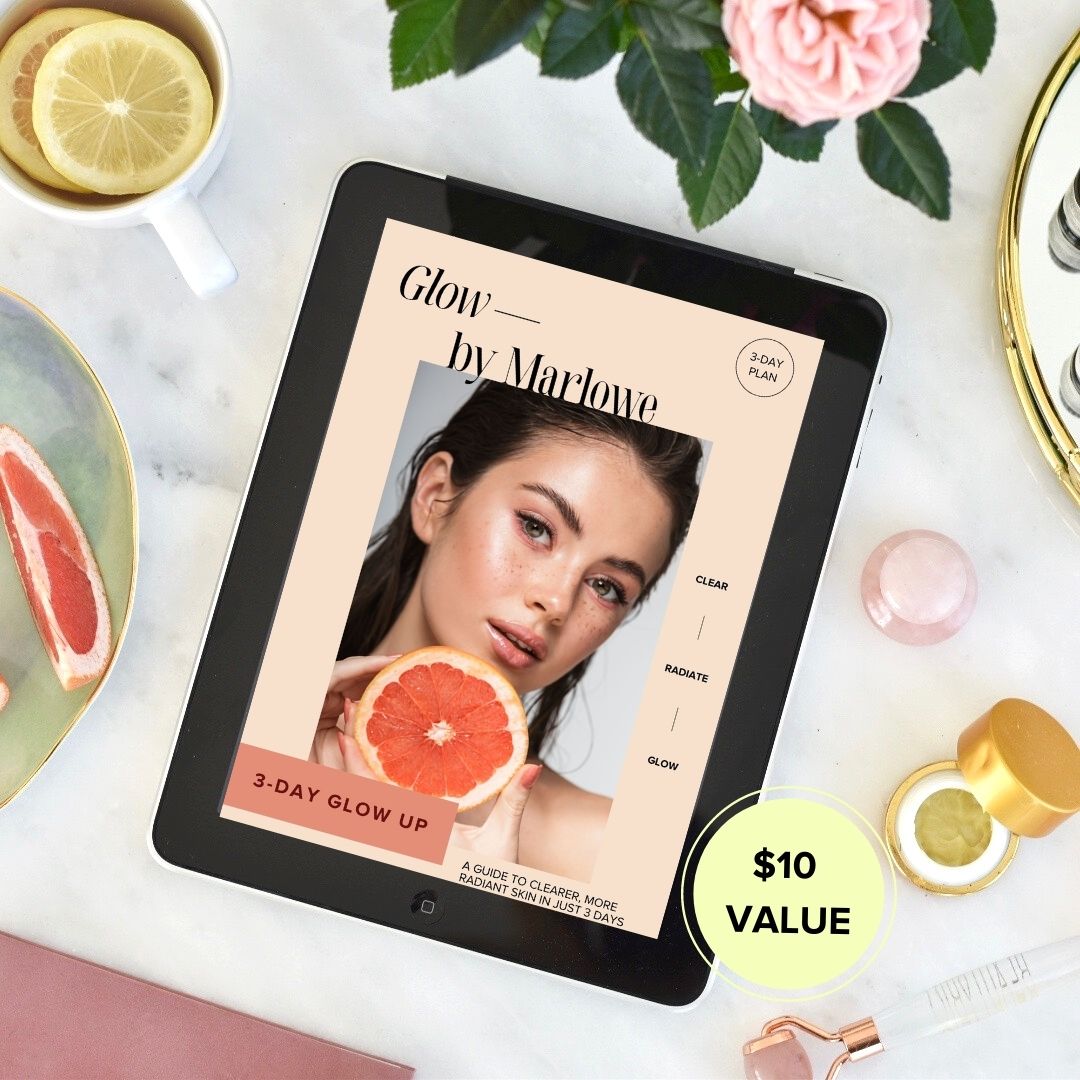
Plus, you’ll receive The Glow Up Guide right away, a delicious 3-day meal plan to reduce redness and bumps, fast.





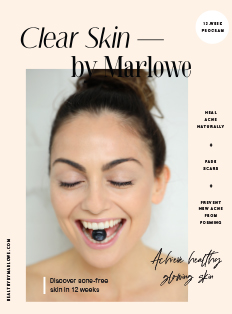
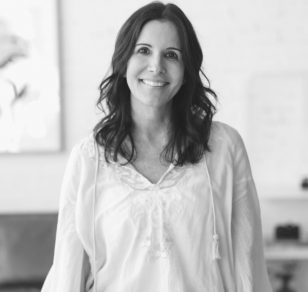
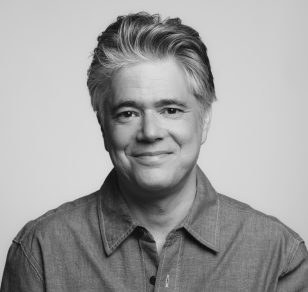
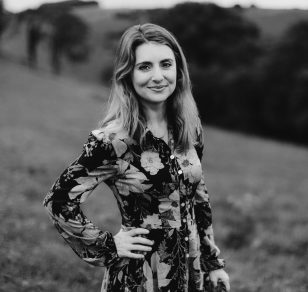
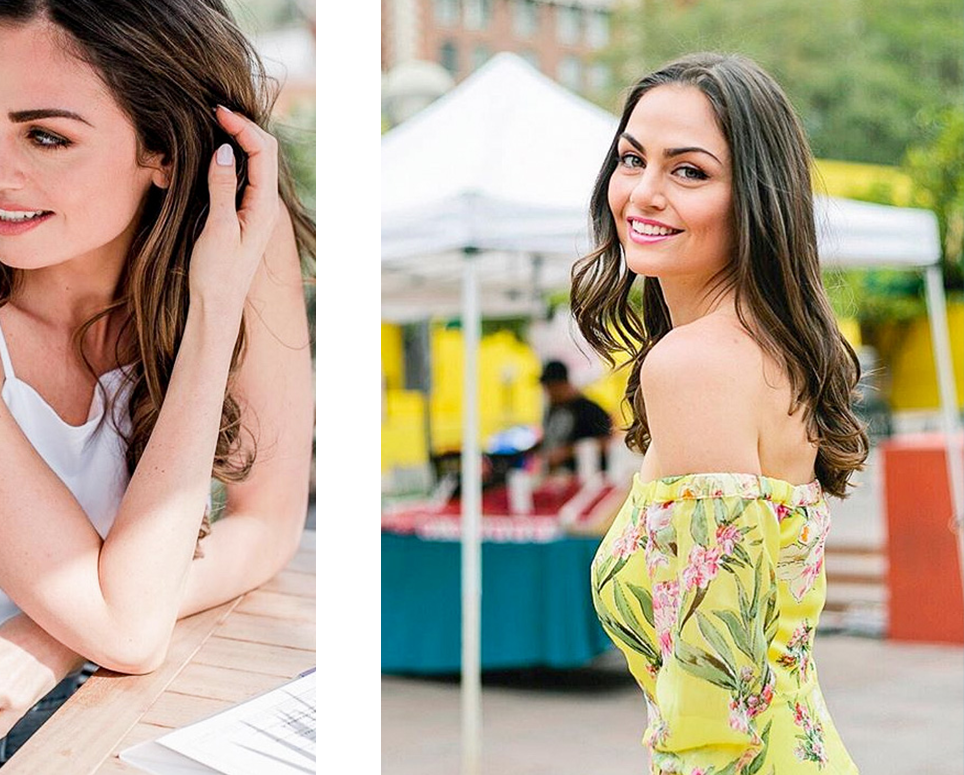



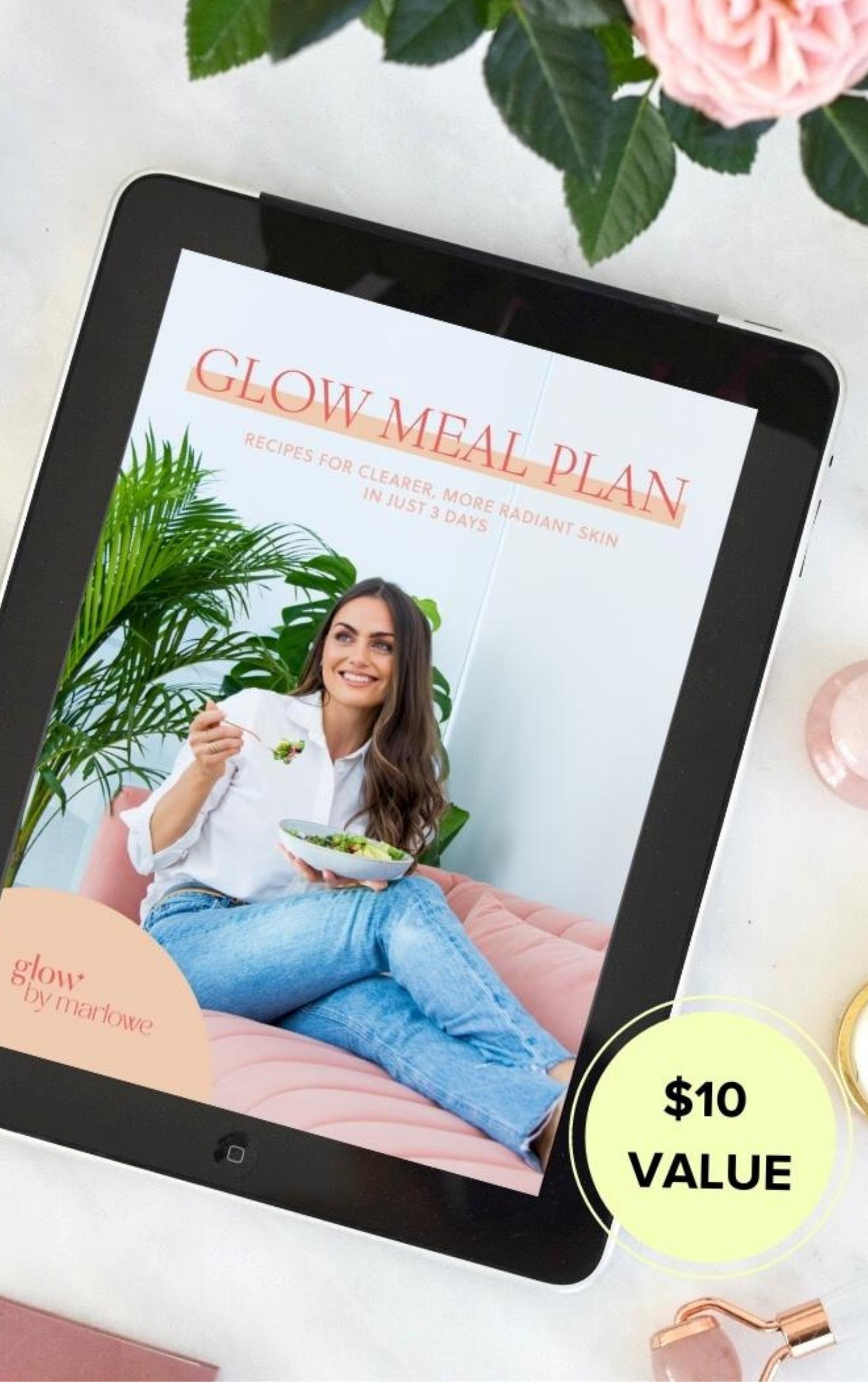
No Comments